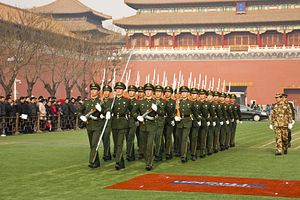Taiwan’s Ministry of National Defense submitted its 2015 report on mainland China’s military to the Taiwanese legislature yesterday. The report noted a variety of scenarios under which China’s People’s Liberation Army (PLA) might invade Taiwan, and outlined the possible attack strategy.
The MND report noted that leaders in Beijing are concerned about the 2016 presidential elections in Taiwan. Tsai Ing-wen, the candidate for the opposition Democratic Progressive Party (DPP) is currently leading in the polls, and Beijing has not-so-fond memories of the previous DPP president, Chen Shui-bian. The MND suggested that recent PLA drills seeming to simulate an attack on Taipei, Taiwan’s capital, were a direct result of Beijing’s worries.
The report said that Beijing might decide to invade Taiwan under a number of circumstances: if Taiwan declares independence or takes steps toward de jure independence; if Taiwan obtains nuclear weapons; if foreign troops are deployed in Taiwan; if there is extreme civil unrest or other internal chaos in Taiwan; if foreign forces interfere in Taiwan’s affairs; or if Taiwan delays cross-strait negotiations on eventual reunification.
In 2005, when Beijing was concerned about the possibility of a move toward Taiwanese independence under President Chen, it passed an “Anti-Secession Law,” which made it clear that Beijing will use “non-peaceful means” if it believes that Taiwan is moving toward independence. The law also allows for the use of force against Taiwan if “possibilities for a peaceful re-unification should be completely exhausted.” It’s that last point that has always worried Taiwan’s leaders – the possibility that Beijing could order an invasion simply because it believes talks on reunification are going nowhere.
As for how China would attack Taiwan, the MND said the PLA would probably use a combination of military threats and a blockade against Taiwan to intimidate Taiwanese. Then Beijing would move to use missiles against Taiwan’s military and political centers. According to the MND, the PLA’s Second Artillery Crops currently has 1,500 missiles deployed against Taiwan. After missile attacks, the PLA would use both aircraft and amphibious vehicles to mount an actual invasion.
The MND noted that vast discrepancies between its military budget and China’s (which increased another 10 percent last year) has tipped the cross-strait military balance in Beijing’s favor. Still, the report emphasized that Taiwan’s armed forces are prepared to defend against a possible PLA attack. Next week Taiwan will hold its annual Han Kuang military exercises, including a new drill simulating the defense of Taipei. The new exercise is named “Counter-Operation Decapitation” – the PLA’s simulated attack on Taiwan’s Presidential Office Building was named “Operation Decapitation.”
Beyond the prospect of a PLA invasion of Taiwan, the MND report also notes that China’s reclamation and construction work in the South China Sea will have the end result of militarizing the outposts. The MND also says that it expects China to declare an air defense identification zone (ADIZ) in the South China Sea. The report says China’s island-building has changed the strategic dynamic in the disputed region.
Taiwan shares China’s claims in the South China Sea, but looks with unease on the growing tensions in the region. In May, Taiwanese President Ma Ying-jeou unveiled a South China Sea Peace Initiative that calls for all claimants to shelve the disputes and seek to jointly develop resources. The initiative also urges all parties to respect international law (particularly the UN Convention on the Law of the Sea) and to set up a code of conduct to reduce tensions.

































